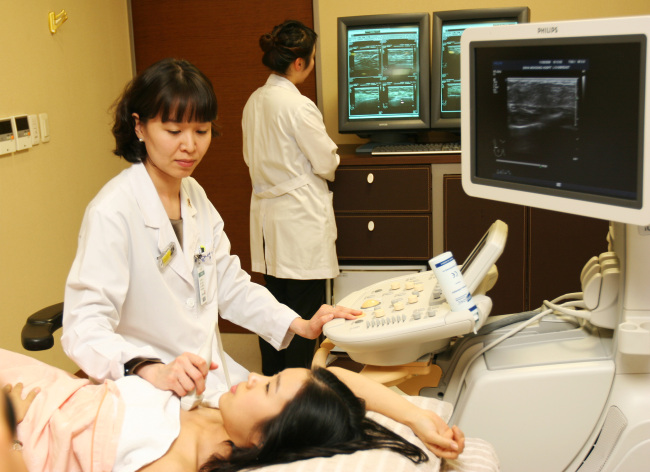 |
A doctor performs a breast ultrasound at Ewha Womans University Medical Center. (Ewha Womans University Medical Center) |
Angelina Jolie’s choice to undergo a double mastectomy has sparked a rise in women wanting to have the same surgical procedure, believing that it can reduce the risk of breast cancer. The breast removal surgery, however, is not a key solution to prevent the disease even for those who carry the same genes as the Hollywood star, a doctor here said.
Moon Byeong-in, head of the Cancer Center for Women at Ewha Womans University Medical Center, said the chances of getting breast cancer for women who are in the same high-risk category as Jolie and who have a relevant family history are very low.
Rather, nongenetic factors play a more significant role in developing the cancer, he said. Hereditary breast cancer accounts for only 7 percent of all breast cancer cases in Korea, he added.
“Most breast cancer patients get the disease due to bad habits, not as a result of an inherited gene mutation,” Moon said.
In this respect, it is much better for women to kick those bad habits if they are worried about the disease, he added.
In May, Jolie revealed her decision in an opinion section in the New York Times that she chose to have a double mastectomy because she was told she carries a faulty copy of the BRCA1 gene which could lead to breast or ovarian cancer. The actress said she lost her mother to ovarian cancer at age 56 and had the surgery to reduce her cancer risk.
Likewise, specific inherited mutations of genes called BRCA1 and BRCA2 are could possibly increase the cancer risk. But having the BRCA defect doesn’t mean that one will automatically get cancer, Moon said. Women must know that their lifestyle choices can prevent cancer more effectively than a radical surgical choice.
Moon suggested eating beans, colorful vegetables and fruits as frequently as possible. Exercise regularly in order to keep a normal BMI range and control stress levels, he added.
Isoflavones in beans can help prevent breast cancer because they control the estrogen level, a factor that increases the cancer risk. A recent study by researchers at Soochow University in China shows that people who ate soy had a 0.75 time lower risk of breast cancer than those who didn’t, Moon said.
“Another study in the U.S. showed that women who ate fermented soy starting at age 5 had a 50 percent lower chance of getting breast cancer,” he said.
It is also important to keep one’s BMI range healthy and normal. Many studies show that breast cancer is related to obesity, said Moon, adding that obesity increases insulin-type hormones which help cancer cells grow and survive.
Exercise to maintain hormones at a healthy level. Those who work out more than five hours a week have a reduction in the distribution of both estrogen and progesterone by 18.9 percent and 23.7 percent, Moon said, quoting a recent study.
“It is better to exercise regularly more than three times a week, 30 minutes a day,” he said.
Rest and think positively because stress is definitely a crucial factor causing the disease. Recent data show that women in their 40s are the most vulnerable to breast cancer in Korea. The breast cancer risk is relatively high among women in this age range not only because of hormonal changes as they experience menopause, but also because they are under enormous stress from both work and home, Moon said.
“It is important to control one’s stress level through positive thinking and getting help from others to resolve stress-triggering problems,” he said.
By Cho Chung-un (
christory@heraldcorp.com)








![[Today’s K-pop] Blackpink’s Jennie, Lisa invited to Coachella as solo acts](http://res.heraldm.com/phpwas/restmb_idxmake.php?idx=644&simg=/content/image/2024/11/21/20241121050099_0.jpg)